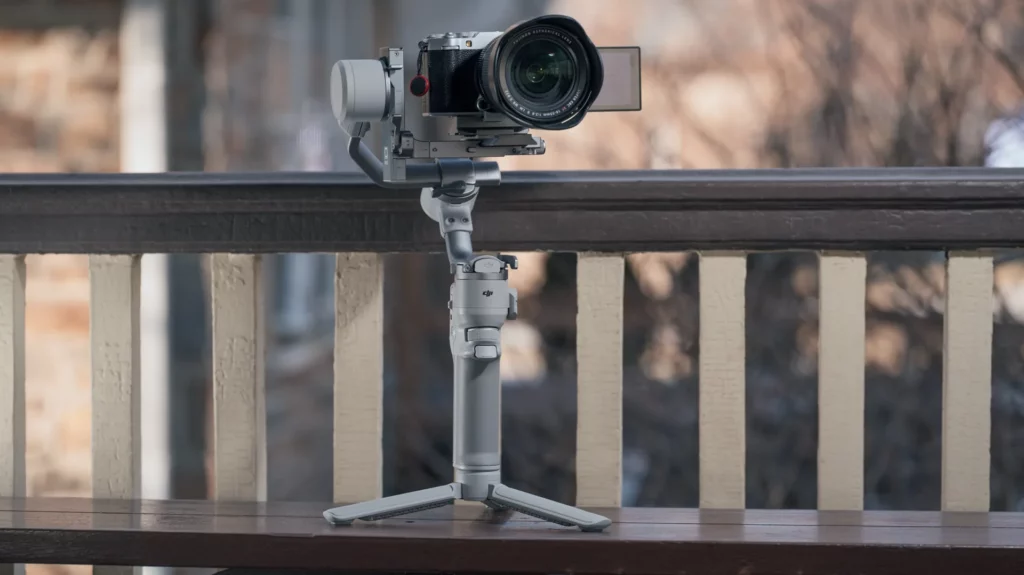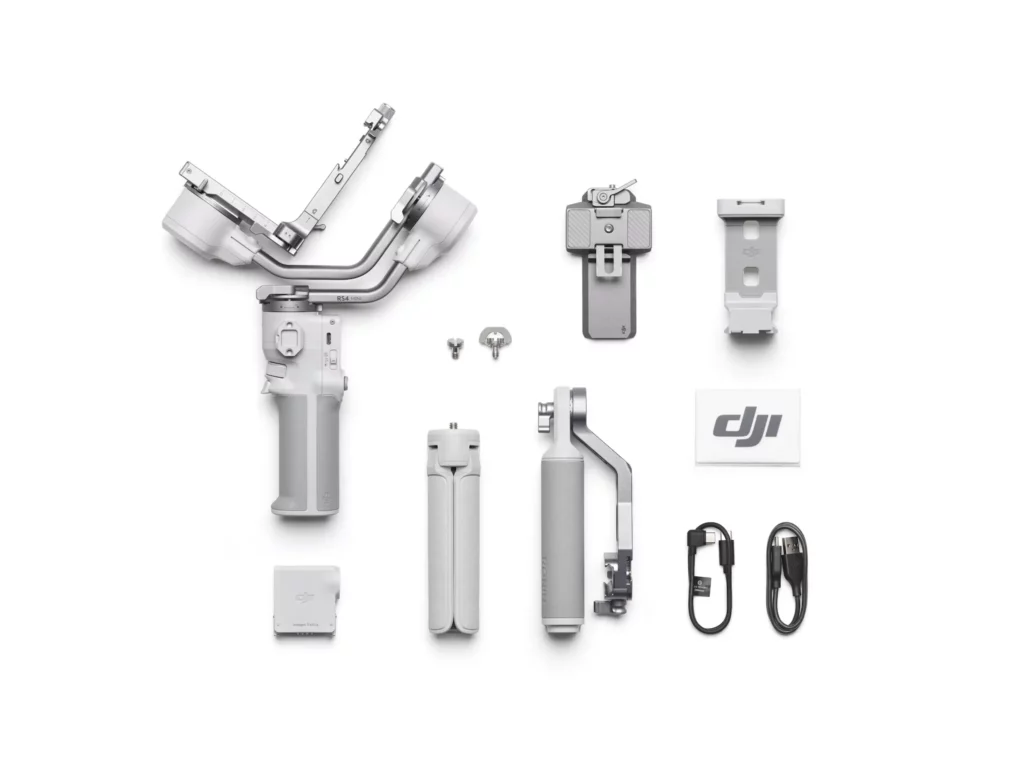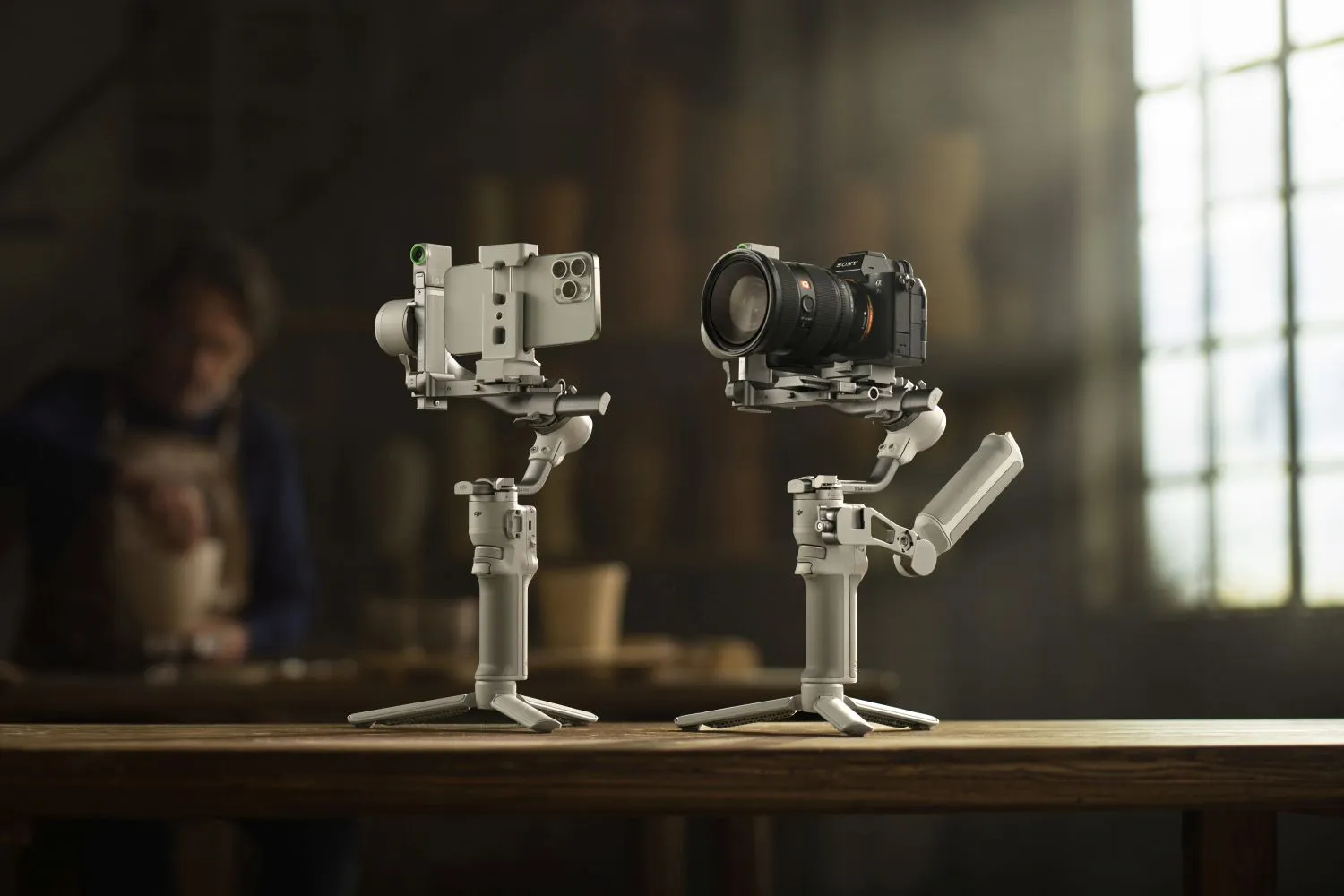Two years after the RS 3 Mini shook up the entry-level mirrorless market, DJI has refined the formula with the RS 4 Mini. Despite weighing just 890 g, this three-axis gimbal supports 4.4 lb / 2 kg rigs, adds auto-axis locks, a 13-hour battery and an optional RS Intelligent Tracking Module. In this DJI RS 4 Mini review 2025 I compare it directly with the outgoing RS 3 Mini and test real-world footage against Zhiyun’s Crane M3 S.

RS 4 Mini vs RS 3 Mini: What’s new?
- Auto-axis locks – set-up in one second, no manual latches
- Longer battery – 13 h runtime, 30 percent more than RS 3 Mini
- RS Intelligent Tracking Module (optional) tracks subjects from 10 m away
- Teflon-coated axes for smoother pans
- Phone holder included in Creator Combo for vertical reels
- Faster vertical switch – turn a knob, no L-bracket needed
Build & Ergonomics
The magnesium-alloy frame feels identical in hand to its predecessor, yet the new auto locks make transport less fiddly. Furthermore, the briefcase handle is now horizontal, cutting low-angle stress on the wrist. The grip texture remains the same rubberised polymer that proved durable on the RS 3 Mini.
Set-Up and Balancing
First of all, balancing a Sony A7 IV with a 24-70 mm f/2.8 took under three minutes. Once balanced, engaging auto-lock freezes all axes for lens swaps. The updated phone holder clicks onto the roll arm without tools, letting me convert to a smartphone gimbal in seconds. The gimbal is designed to be balanced with various mirrorless cameras out of the box:
- Canon R5 + RF 24-70mm F2.8
- Sony A7S3 + FE 24-70mm F2.8 GM2
- Nikon Z7 2 + Z 24-70 mm F2.8
- Panasonic S5 + L 20-60mm F3.5-5.6
Payload Reality Check
DJI claims 4.4 lb / 2 kg; real-world sweet spot sits nearer 1.8 kg. My Panasonic S5II with 35 mm f/1.8 (1.74 kg) remained stable for one-hour interviews. At 2 kg, motors run hotter though they never vibrated. The gimbal is

Stabilisation Performance
During a 4 K/60 run-and-gun test, footage at 85 mm showed 12 percent less micro-jitter than RS 3 Mini, thanks to new PID tuning. Sport mode stiffens axes enough for fast car-rig shots, though DJI’s RS 4 Pro still leads for 135 mm tele work.
Battery Life & Charging
The 3 100 mAh pack ran 10 h 5 m in mixed shooting (50 percent Sport mode). PD charging refilled to 80 percent in 1 h 15 m – right on DJI’s spec sheet.
AI Tracking Module
The optional module (part of the Combo kit) bolts onto the cold-shoe and recognises faces at over 10 m. It obeys hand gestures to start or stop tracking and maintained a dancer’s framing even at f/2.8 background blur.
DJI RS 4 Mini Combo

The DJI RS 4 Mini also comes as a bundle option with the Smart Tracking Module, the Intelligent Tracking Module and the Mini briefcase handle all included. A good option if you want to take advantage of all teh features the gimbal has to offer.
RS 4 Mini vs Competitors
| Spec | RS 4 Mini | RS 3 Mini | Zhiyun Crane M3 S |
|---|---|---|---|
| Weight | 890 g | 795 g | 795 g |
| Payload | 4.4 lb / 2 kg | 4.4 lb / 2 kg | 2.64 lb / 1.2 kg |
| Auto Locks | Yes | No | No |
| Tracking Module | Optional | No | No |
| Battery (real) | ≈10 h | ≈7.5 h | ≈8 h |
| Base Price | $369 (recent sale $237) | $329 | $319 |
Pros and Cons
Pros
- Auto-axis locks speed up lens swaps
- Longer battery with faster PD refill
- Optional AI module brings subject tracking to mirrorless rigs
- Quick vertical switch for reels
- Competitive pricing during spring sale
Cons
- Slightly heavier than RS 3 Mini
- AI module costs extra unless you buy the Combo
- Motors warm near full 2 kg payload
Who Should Buy the RS 4 Mini?
If you are a travel filmmaker or wedding shooter running mirrorless bodies under 1.8 kg, the RS 4 Mini delivers pro-level stability without luggage pain. Conversely, if you shoot 135 mm tele lenses or heavy cinema glass, step up to RS 4 Pro.
Final Verdict
The RS 4 Mini refines an already solid platform. Auto locks and longer battery fix the RS 3 Mini’s biggest pain points, while the optional tracking module future-proofs solo shooters. At its recent $237 sale price, it is the best value travel gimbal of 2025.
Official Product Page: DJI RS 4 Mini – Lightweight 3-Axis Gimbal
Check out the DJI RS 4 Mini on Amazon
Related Guides:
Frequently Asked Questions
What is the real-world payload limit?
The gimbal is rated for 2 kg but performs best below 1.8 kg for long takes.
Is the Intelligent Tracking Module included?
Only in the Combo or Creator bundles; the base kit omits it.
How long does the battery last while tracking?
Expect around 8.5 hours with continuous AI tracking and Sport mode.
Can I switch to portrait without tools?
Yes, twist the new knob and the camera plate locks vertical in seconds.
Does it work as a phone gimbal?
Yes, the Creator Combo includes a phone holder; payload is ample for heavy smartphones.

